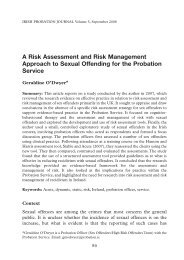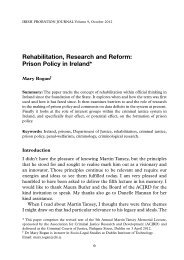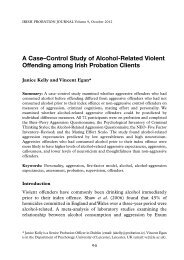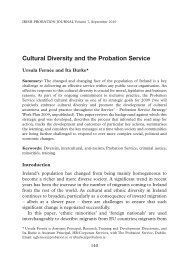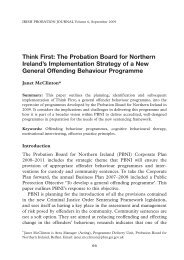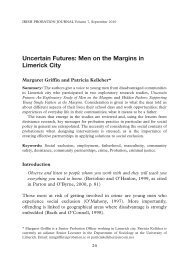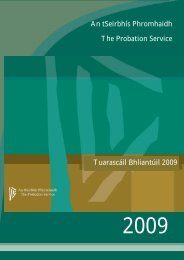Perceptions Of Restorative Justice In Ireland - The Probation Service
Perceptions Of Restorative Justice In Ireland - The Probation Service
Perceptions Of Restorative Justice In Ireland - The Probation Service
You also want an ePaper? Increase the reach of your titles
YUMPU automatically turns print PDFs into web optimized ePapers that Google loves.
<strong>Perceptions</strong> of <strong>Restorative</strong> <strong>Justice</strong> in <strong>Ireland</strong> 189<br />
benefit could arise from such a meeting. <strong>The</strong> answers to this question<br />
revealed myriad considerations from ‘One advantage is that the victim<br />
would know the outcome of the process. At the moment the victim can<br />
often not know the progress of their case’ to the extremely upbeat ‘Yes.<br />
I have first hand experience and I have seen it work. I found it<br />
unbelievably positive.’ This positive approach was counterbalanced with<br />
the view ‘Victims can be very vulnerable. <strong>The</strong>ir consent would be vital’<br />
and also with negative sentiments such as ‘I think it would be just a bad<br />
idea’ and ‘It would be lunacy, there would be murder.’<br />
<strong>The</strong> answers to this question reveal a very interesting dichotomy of<br />
views. One of the principal aims of RJ is to empower victims to face the<br />
offender, highlight the hurt and injury the offender’s behaviour has<br />
caused and seek answers. This is in contrast to the general criminal<br />
justice system, where it is usual for the victim to have little or no role in<br />
the process. Victims are reported to feel frequently that they have no say<br />
and to feel neglected as their role is reduced to that of a witness, at best.<br />
This is illustrated in the answer above, where it was stated that victims<br />
often are not even aware of the progress of their case through Court. <strong>The</strong><br />
lack of input of the victim into the traditional criminal law process was<br />
seen in another answer when the respondent stated that ‘Normally the<br />
victim doesn’t get a word in edgeways in Court’.<br />
One respondent pointed out a benefit of the RJ system: ‘It would allow<br />
them information, for example why they were attacked etc.’ This<br />
respondent identified a criticism of the current criminal justice system in<br />
<strong>Ireland</strong> in that the focus is very much on the offender.<br />
<strong>In</strong> RJ the victim is in a position to seek explanations and assurances<br />
from the offender. <strong>The</strong> process may include an apology, which many<br />
victims greatly value, or it may allow the victim to receive some form of<br />
material and psychological reparation. A recent study reported that 89%<br />
of the victims who participated in an RJ system received an apology,<br />
compared to only 19% of the victims whose cases were dealt with in<br />
Court (Wright, 2010) Victims whose cases were dealt with under the RJ<br />
scheme were also found to be much more likely to feel that the apology<br />
was sincere (Wright, 2010, p. 27). Furthermore, in the same study it was<br />
found that the victims who had engaged in the RJ programme were much<br />
less likely to be fearful of being re-victimised: 10% of those who had been<br />
through an RJ programme feared re-victimisation, compared to 25% of<br />
those whose cases had been through the traditional criminal justice<br />
process (Graef, 2001, p. 30).



